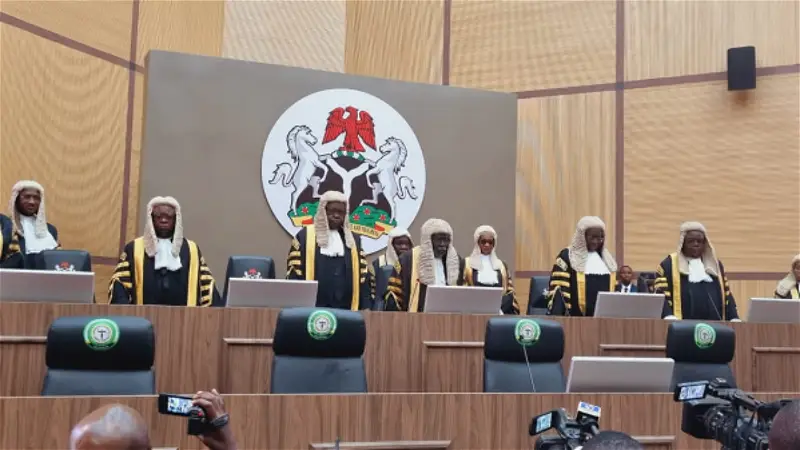Respite came the way of eight Governors on Friday, as the Supreme Court, in a marathon judgement, affirmed their election victory.
In a marathon judgement that lasted over seven hours, the apex court, decided various appeals that trailed the outcome of governorship elections that held in the states on March 18, 2023.
Major beneficiaries of the judgement day were the governors of Kano and Plateau states, Abba Yusuf of the New Nigeria Peoples Party, NNPP, and Caleb Muftwang of the Peoples Democratic Party, PDP, respectively, whose elections were nullified by the Court of Appeal but reversed by the Supreme Court.
Though each case was decided by a five-member panel, however, in an unprecedented development, eight Justices of the apex court sat till all the appeals were determined.
The first appeal the court settled was the governorship dispute in Lagos State.
In a unanimous decision, the Supreme Court validated the re-election of Governor Babajide Sanwo-Olu, who was the flag-bearer of the All Progressives Congress, APC, even as it dismissed two separate appeals that were lodged by candidates of the Labour Party, LP, Mr. Gbadebo Rhodes-Vivour and that of the Peoples Democratic Party, PDP, Abdulazeez Adediran, popularly known as Jandor.
The LP and its candidate had prayed the court to determine whether Sanwo-Olu was qualified to contest the election, considering that his deputy and running mate, Obafemi Hamzat, has dual citizenship.
The appellants alleged that the Lagos State deputy governor took the citizenship of the United States of America, USA.
They argued that since the deputy governor, by his action, was constitutionally ineligible to contest the election, it invalidated Sanwo-Olu’s candidacy at the election.
In its lead judgement that was delivered by Justice Mohammed Garba Lawal, the Supreme Court said there was no evidence that Sanwo-Olu’s deputy denounced his Nigerian citizenship.
It held that the prohibitions in section 28 of the 1999 Constitution, as amended, does not apply to a person that is a Nigerian citizen by birth.
According to the Supreme Court, there is no law stripping a Nigerian citizen by birth, from enjoying his status, rights and privileges, owing to the acquisition of the citizenship of another country through naturalization.
The apex court held that Hamzat’s declaration of allegiance to the USA was not legally sufficient to strip him of the right to contest an election in Nigeria.
It said the appellate court was right when it affirmed the judgement of the tribunal which held that Sanwo-Olu and his deputy were not constitutionally disqualified from contesting the governorship poll.
Likewise, the court dismissed the appeal by PDP candidate, Adediran, noting that some of the issues he raised in his case were already statute-barred.
Justice Adamu Jauro, who delivered the lead judgement in his matter, upheld a preliminary objection the Respondents raised to challenge the competence of the appeal.
He held that since Adediran’s case bordered on the eligibility of Sanwo-Olu and his deputy, the trial tribunal, lacked the jurisdiction to entertain the matter.
The Appellants had insisted that they were denied fair hearing by the lower courts, adding that part of their case was that the deputy governor tendered a forged West African Examination Council, WAEC, certificate to INEC, in aid of his qualification to contest the election.
They alleged that a master list that WAEC was subpoenaed to produce before the tribunal, showed that the name on the certificate the deputy governor tendered to INEC, was different.
While dismissing the appeals, a member of the apex court panel, Justice Emmanuel Agim, described both Rhodes-Vivour and Adediran’s cases as “meaningless disputations”.
He held that the case the LP candidate instituted to challenge Sanwo-Olu’s election was based on the wrong interpretation of both sections 182(1)(a) and 28(1) of the 1999 Constitution, as amended, saying it amounted to a gross abuse of the court process.
Shortly after Lagos, the Supreme Court, upheld the election of Governor Bala Mohammed of Bauchi State.
In its lead judgement, delivered by Justice Ibrahim Saulawa, the court dismissed an appeal the APC and its candidate, Sadique Abubakar, filed to challenge the outcome of the governorship election that held in the state.
Abubakar and his party had contended that Governor Mohammed, who was the candidate of the PDP, was not the valid winner of the gubernatorial contest.
They alleged that the election was not conducted in substantial compliance with the Electoral Act 2022, insisting that several electoral documents that were used during the poll, were not properly filled.
However, both the Bauchi State Governorship Election Petitions Tribunal and the Court of Appeal in Jos, dismissed Abubakar’s case and upheld Governor Mohammed’s election victory.
Dissatisfied with the concurrent verdicts of the two lower courts, the APC candidate lodged an appeal before the Supreme Court, contending that his case vis-a-vis the exhibits that were tendered in evidence by the parties, were not properly evaluated by the tribunal.
Read Also: N70bn alleged fraud: We ‘ll revisit Matawalle’s case,EFCC Chairman vows
While dismissing the appeal on Friday for want of merit, the apex court said it found no reason to dislodge the judgements of the lower courts.
It resolved all the issues that were formulated by the appellants, against them.
On the Kano governorship dispute, the Supreme Court reversed the judgement that sacked governor Yusuf of the NNPP.










